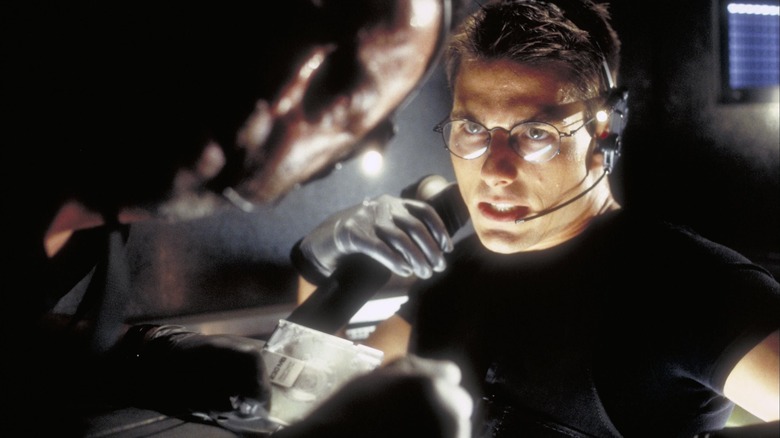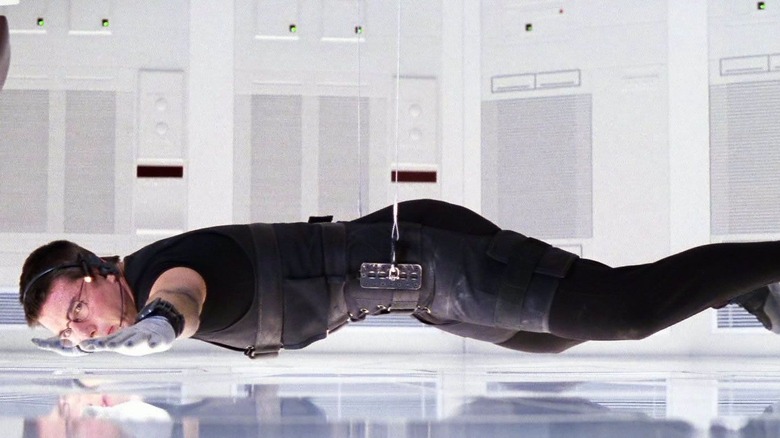
Brian De Palma's 1996 action thriller "Mission: Impossible" is, compared to its sequels, terse and restrained. Its helicopter chase through the Chunnel notwithstanding, "Mission: Impossible" is more about negotiation with villains, eluding assassination, and heist movie shenanigans. Before star Tom Cruise began grasping onto the sides of actual airplanes, the tensest moments in "Mission: Impossible" came when a single drop of sweat nearly touched an alarm sensor.
"Mission: Impossible" also disappointed fans of the 1966 TV series on which it was based. The series was typically about entire teams of spies, working together to undo -- or commit -- acts of espionage. The first act of De Palma's film introduces a diverse team of players (played by the likes of Kristen Scott Thomas, Emilio Estevez, and others) only to immediately kill them off during their first mission. Ethan Hunt (Cruise) is the only agent to survive, and he spends the film assembling a new team. "Mission: Impossible" wasn't about the agency or its inner workings, but rogue agents stopping evil billionaires. It became, essentially, an American James Bond movie.
Although an enormous hit, "Mission: Impossible" felt scattered and a mite unfocused, and only received lukewarm reviews. The film currently holds a less-than-auspicious 66% approval rating on Rotten Tomatoes, with some critics calling it flat or confusing. In a commentary track on the "Mission: Impossible" DVD, Cruise blamed the lack of focus on the fact that the screenplay was still being massively rewritten during shooting. The film's first screenwriter, David Koepp, had to leave the production to direct "The Trigger Effect," and only then was the film's other credited screenwriter, Robert Towne, brought on.
Re-Writing On The Fly

As Cruise himself describes, he, De Palma, and screenwriter Steve Zaillian came up with the general story of "Mission: Impossible" while Koepp was starting to write the screenplay. This was after the studio had thrown out a script by Willard Huyck and Gloria Katz (as detailed in the December 1995 issue of Entertainment Weekly). On the same commentary track, Towne reveals that the unique shooting schedule of the film allowed for small windows of time to open up, permitting rewrites to be done on the fly. While effects shots were being filmed, he and the film's star would rework scenes to be filmed later in the week ... or later in the day. Towne described the process thus:
"Fortunately for me at least, and then I guess ultimately for the film, what happened was that the first things that they shot was the blue screen stuff, on the train and everything else. And as that was going on, Tom and I, we would go over the scenes that were to be shot, and I would rewrite them in the middle of the night. And sometimes even between takes."
Towne doesn't reveal what the film was meant to look like prior to the re-writes, but clearly, he, or perhaps just Cruise, didn't like what was happening. One issue that did arise, as reported by CinemaBlend, was a love triangle between Ethan Hunt, his boss Jim Phelps (Jon Voight), and Phelps' wife Claire (Emmanuelle Béart). Evidently, George Lucas (!!!) saw the early love-triangle scene and asked personally that De Palma remove it. He did.
Like most Hollywood blockbusters, many, many people had a hand in the screenplay. What could have been chaos, weirdly hung together. At least well enough to warrant multiple successful sequels.
Read this next: The 14 Greatest Action Movies Of The 21st Century
The post Never Having A Finished Script Worked To Mission: Impossible's Advantage appeared first on /Film.
0 Commentaires